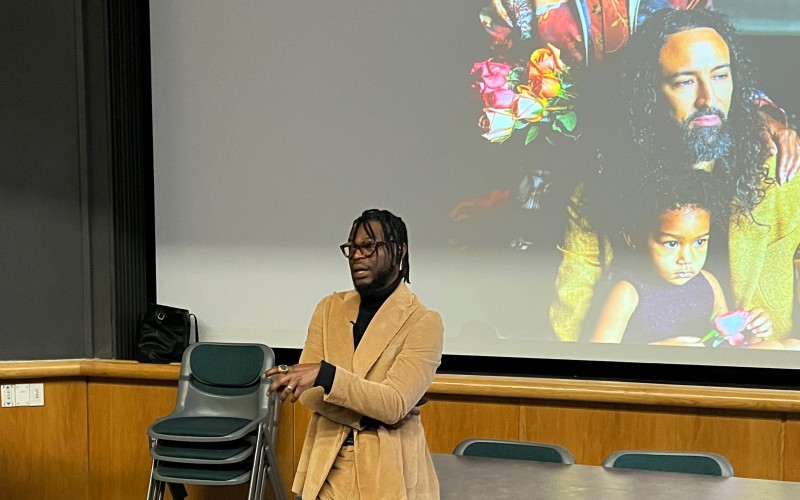
Director, writer and designer Walé Oyéjidé, spoke, dined with students and premiered a film at the annual Nixon Distinguished Lecture Series on April 20. His talk, “Beauty is the Weapon of the Future,” highlighted the ways he uses his multi-faceted design work to raise awareness of the complex issues of migration and celebrate the perspectives of marginalized people.
Oyéjidé explained to the predominantly student audience that one’s life path is circuitous and that there is value to each experience, saying, “The road is not linear for anyone — in career, in practice, in anything.” He shared his own history, first as an aspiring musician, then attending law school and practicing as a litigator before honing his design skills over the last 10 years. In both the Nixon lecture and in a small-group luncheon with Human Centered Design students, he described the value of these multidisciplinary experiences in shaping his success today. “There are things that you can do, and there are things that you are made to do.”
He reminded the audience to be specific and intentional in their work; with time one finds their own true voice. Oyéjidé also discussed the balance of creating work that is both meaningful and commercially viable, fielding questions from the audience about how this is achieved. “We hope that even if the person consuming the work has no interest in my mission or intention, that the work is still visually beautiful.”
During the lecture, Oyéjidé spoke about casting African refugees as models and actors in his media, whom he pays as he does his professional collaborators. “We have the tools to reshape the narratives that society creates about those who are less privileged,” he said. By featuring refugees in his fashions and films, he uses beauty to highlight their stories, which may otherwise go untold or be told inauthentically.
“Often the photos we see of refugees are meant to shock. They do not demonstrate the nobility, love and grace it takes to make the journey,” said Oyéjidé. “What would happen if I put these people in clothing that you could not look away from?”
The day’s final event was a viewing and discussion of Bravo, Burkina, his debut feature film, which premiered earlier this year at the Sundance Film Festival. The one-hour film humanizes the painful challenges of migrants who surrender their homelands and face precarious journeys to better the lives of others.
“I have been interested in and followed Oyéjidé’s work for some time,” said Catherine Kueffer Blumenkamp, Nixon host, lecturer and curator of the Cornell Fashion + Textile Collection. “He proved to be a dynamic artist and speaker and was especially personable and engaging with the students.”
Oyéjidé’s designs have appeared in major motion pictures, including Black Panther, and have exhibited in museums around the globe. He has collaborated with stars such as the rapper Nas and Ultimate Fighting Champion Kamaru Usman. He is also a Sundance Feature Film Fellow, National Geographic Explorer, TED Fellow, Open Society Foundations Fellow and Google Image Equity Fellow. His short film After Migration: Calabria is currently streaming on Criterion Channel.
The events were part of the Nixon Distinguished Speaker Series hosted by the College of Human Ecology and the Department of Human Centered Design. Established through a gift from John W. and Lea P. Nixon, Class of 1953, the series brings prominent figures in the apparel and textile industry to campus for a rich and accessible academic conversation.